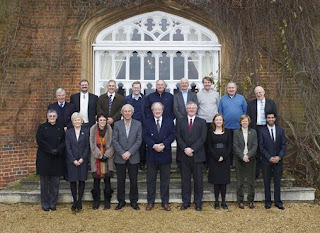I had intended to write this week’s blog on the remarkable upturn in the study of ancient Greek and Roman history in Australia’s secondary schools, where it is now more popular than Modern History, but try as I may to get away from industrial conflict, it seems to be following me around.
On Friday night in Sydney my children and I got onto our Qantas flight to London. It turned out to be one of the very last Qantas flights to leave Australia before the entire domestic and international fleet of this old, prestigious, much-loved airline was grounded by its own Chief Executive, Alan Joyce.
 |
| Alan Joyce |
This is an extraordinary step for an airline boss to take—in Joyce’s own words, ‘an unbelievable decision’.
The Australian prime Minister stepped in and referred the matter to an emergency session of Australia’s industrial tribunal, which has now ruled that the unions and management should return to the negotiating table and come to an agreement within 21 days or face binding arbitration.
Joyce put at risk thousands of passengers and jobs, the future of the airline, and even the national economy of Australia. His strategy was designed to make the unions of airline workers come to heel and agree to stop all industrial action straightaway. He did not want to negotiate with them but to force them back to work on his dictatorial terms.
The fact that he grounded the fleet just one day after raising his own salary by a massive 71 percent to five million Australian dollars p.a. shows that he is not a tactful man, but we shall have to wait and see whether this is the worst that can be said about him. It is not clear that his company can ever recover from his divisive and high-handed tactics. He has damaged the relationships between management and workers profoundly.
While Qantas employees and all Australia wait to see whether Joyce’s company can recover from behaviour which Captain Richard Woodward, vice-president of the Australian and International Pilots Association, has described as ‘megalomaniacal,’ the situation at Royal Holloway remains critical.
 |
| Paul Layzell |
The first formal ‘consultation’ between the Classics Department staff and members of the Senior Management Team takes place tomorrow morning at Egham, inauspiciously on Halloween; there are still three weeks until the next meeting of College Council.
But while on the other side of the world Alan Joyce refused to continue talking to his own workers, at Royal Holloway the Chair of our Union (the University and College Union) Bruce Baker, has just this morning felt forced to resign.
Baker writes ominously to UCU members that he does not ‘believe that the Senior Management Team has now, or has ever had in the time I have been at Royal Holloway, any genuine interest in establishing constructive relations with the UCU or acknowledging that employees, including academic staff, should have a collective role in determining the conditions under which they labour.’
The ancient Greek biographer Plutarch liked to write history in terms of parallel biographies comparing Greek and Roman individuals whose careers shared similar features. The Athenian general Nicias was compared with the Roman Crassus, for example, because the former was responsible for the Sicilian disaster and the latter for the Parthian disaster.
Perhaps the 21st-century equivalent would be the Parallel Disasters brought on worker-management relationships in old and prestigious British and Australian organisations.



